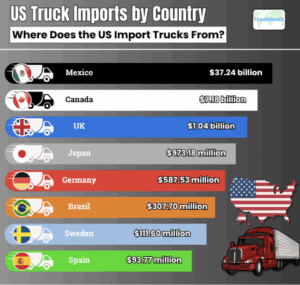Key Takeaways
Beginning November 1, all foreign imports of medium and heavy-duty trucks and truck parts into the United States are tariffed at 25%, and buses at 10%.
For trucks traded under the Canada-U.S.-Mexico Agreement, the 25% tariff applies to their non-American parts.
An import adjustment offset set at 3.75% of the total value of all trucks built domestically between 2025 and 2030 will be provided to producers that assemble trucks in the United States with imported parts.
Tariffs will not be stacked, so trucks, truck parts, and buses subject to the new tariffs will not be subject to additional or existing sectoral tariffs on steel, aluminum, copper, autos and auto parts, and lumber.
Trucks and buses will not be subject to reciprocal tariffs or additional tariffs imposed on Canada, Mexico, Brazil, or India.
On November 1, President Trump imposed a 25% tariff on imports of medium- and heavy-duty trucks, which will mostly affect imports from Mexico and Canada, and a tariff of 10% on buses. The U.S. gets 78% of heavy truck imports from Mexico and 15% from Canada. Imports from Mexico tripled since 2019. As reported by the Epoch Times, in the past, Mexican-built trucks could use non-tariffed Chinese parts and foreign steel and aluminum and had a $10,000 cost advantage over U.S.-built trucks. Mexican-built trucks were imported into the United States tariff-free if they met the U.S.–Mexico–Canada Agreement (USMCA) rules of origin for finished vehicles.
Under the new tariff, trucks traded under the USMCA will incur a 25% tariff on non-U.S. components. For medium- and heavy-duty trucks that do not qualify for preferential tariff treatment under the USMCA, the tariff will apply to the full value of the vehicle. Manufacturers assembling trucks in the United States with imported parts may offset tariffs by an amount equal to 3.75% of the total value of all trucks built domestically between 2025 and 2030. Via the Epoch Times, the policy avoids stacking parts tariffs with other steel, aluminum, or reciprocal tariffs, preventing double penalties on U.S. producers. In August, the Commerce Department imposed 50% tariffs on steel and aluminum derivative products imported to the United States.
In 2024, the United States imported around a record high $47.8 billion worth of trucks, including both finished vehicles and specialized work trucks — a growth rate of around 9% compared to 2023 — with Mexico and Canada providing most of those imports, as depicted below.

The One Big Beautiful Bill Act (OBBBA), signed into law on July 4, has incentives for U.S. manufacturers. According to the Epoch Times, it will provide customers with 100% bonus depreciation, a tax benefit that allows businesses to immediately deduct the entire cost of qualifying property that has a useful life of 20 years or less, rather than spreading it over several years. One company that believes that the OBBA will help U.S. manufacturers is Paccar. A U.S. truck manufacturer, Paccar, controls more than 30% of the U.S. heavy-duty truck market, manufacturing more than 98% of its heavy-duty trucks for the U.S. market in Ohio, Texas, and Washington state.
Via the Epoch Times, in September, North American Class 8 truck net orders were at 20,659 units, up by 62% from August but lower by 41% from 2024. Class 8 truck orders have trended below previous-year levels due to weak freight demand, higher costs, and low carrier profits. Tariff uncertainty and a soft economy are keeping most fleet owners focused on replacement rather than expansion. Class 8 trucks primarily include semi-trucks, large dump trucks, and concrete mixers, along with most over-the-road freight haulers.
Analysis
The Trump administration is attempting to implement truck and truck part tariffs in a manner that doesn’t significantly burden auto manufacturers, especially those that assemble in the United States. However, these reductions won’t change the underlying fact that tariffs will hurt auto manufacturers and consumers. As we’ve written previously, “tariffs will disproportionally harm smaller producers, stifling market competitiveness and preventing many from realizing the American dream.”
For inquiries, please contact [email protected].



